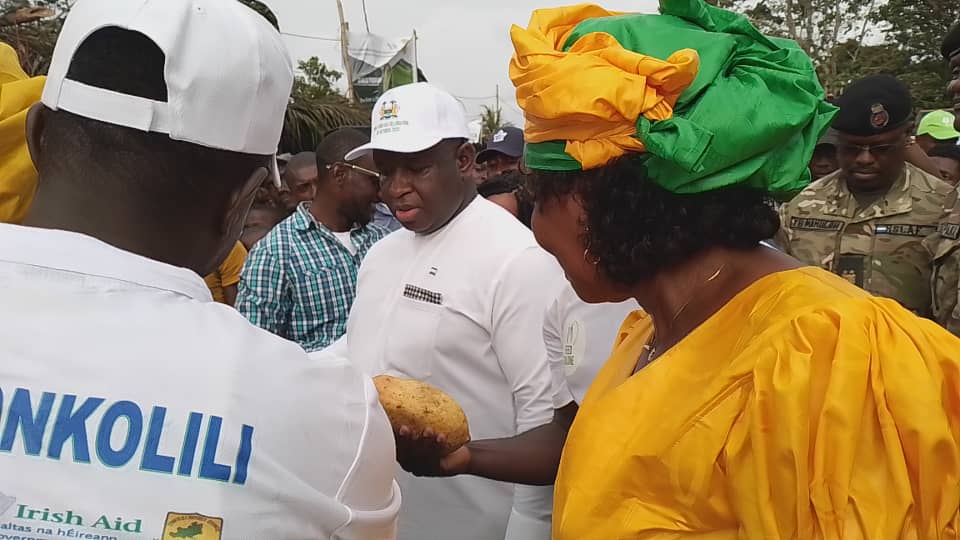By Brima Sannoh in Pujehun
Ibrahim ‘Tawa’ Conteh, Chairman of the Parliamentary Oversight Committee on Agriculture, has said that for Sierra Leone to attain food self-sufficiency, it must have the right funding required, more than the 10 percent African Union threshold, known as the Maputo Protocol.
Hon. Conteh said it would take a concerted efforts that include private sector participation, to ensure that all inputs are not just available but that they reach farmers in good time for successful cultivation.
He was speaking during the official launching ceremony of ‘Feed Salone,’ an initiative of the ‘New Direction’ administration of President Julius Maada Bio, during the official opening ceremony of World Food Day on Monday, 16 October, in Pujehun.
‘Feed Salone’ is one of the ‘Big Five’ priority development programmes unveiled by President Bio shortly after his re-election for his second and final term as president.
On Monday, the President told audience at the event held at the PDEC Field in Pujehun Town that he hopes Sierra Leone could attain food self-sufficiency through this initiative.

Despite successive governments presenting agriculture at the top of their priority list, the sector has hardly received the right attention, as illustrated by recurrent low budgetary allocation.
Since 2003, when African Union heads of state adopted the Maputo Declaration on Agriculture and Food Security, which commits member countries to allocate at least 10 percent of their national budgetary resources to agriculture and rural development, Sierra Leone has never met the threshold.
In the last 10 years, the budget for the sector has revolved between 5% and 9%, yet the sector is so important that it is the main economic activity of the country, contributing almost two-fifth to its GDP in 2021 and 2022, with 57.4 percent and 57.5 percent, respectively, according to data from Statistics Sierra Leone.
According to the presidency, Feed Salone has five specific goals: reducing importation of key staple foods (rice, onions, and poultry); boosting export earnings from the country’s cash crops; creating jobs, rejuvenating rural areas using agriculture as the driver of new growth; reducing hunger and malnutrition; and building resilience to economic shocks.
Earlier in the month, Bio hosted a roundtable on the initiative, bringing together government and its major development partners.
At that event, the president promised to allocate 10 percent of the national budget over the next five years. He also promised to establish a Presidential Council on Agriculture, to be chaired by himself, to oversee the “successful implementation” of the programme.
But Hon. Conteh, a Member of the governing Sierra Leone People’s Party in Parliament, reminded President Bio, amid the fanfare of Monday’s celebrations, that his promise of eradicating hunger in the country was not the first, citing similar unfulfilled commitments by two of his predecessors – Presidents Ahmad Tejan Kabba and Ernest Bai Koroma.
“In 2002, the late former President Ahmed Tejan Kabbah promised that he will make sure Sierra Leoneans will not go to bed hungry. In 2012 former President [Ernest Bai] Koroma also promised that he will make Sierra Leone food self-sufficient. It did not happen as promised,” Conteh said.
He added: “We believe in you. We believe that you will succeed to feed Salone because you promised us to bring free quality school education and you did it,” the MP from Constituency 132 added.

Conteh, known for his outspokenness, however warned that even Bio himself can only stand a chance of succeeding with such an ambitious mission with the right funding, which, he stressed, must be above the 10 percent Maputo threshold.
“Ten percent of Sierra Leone’s budget is NLe300billion, which is equivalent to US$124million,” he said, adding: “What we need to feed Salone is US$1.6bllion.”
According to Conteh, ‘Feed Salone’ can only succeed with the participation of partners like commercial banks, whose role is “crucial” in raising that amount.
“The farmers are also very important in this ‘Feed Salone” drive; but above that, the [parliamentary] oversight committee needs to look into the reason why the two former Presidents did not succeed in agriculture, because if he (Bio) is to succeed, we have to ensure that research is up to date, seeds are supplied to the farmers in time, the fertilizers are available and are distributed transparently,” Conteh stressed.
World Food Day is celebrated annually on October 16, to commemorate the date of the founding of the United Nations Food and Agricultural Organization (FAO) in 1945. It is basically used to create awareness on the issues around food, poverty and hunger, with the goal of inspiring global efforts to produce enough food for the world’s population.
This year’s theme for the event is ‘Water is life, Water is food. Leave no one behind.’
Various speakers at the opening ceremony in Pujehun, from the president to the minister of Agriculture, as well as representatives of development partners, everyone recognized the crucial role played by farmers and the need to empower them to ensure their maximum participation towards the realisation of the ‘Feed Salone’ dream.
But Yatta Sama, National President of the Farmers Federation, said as farmers, they were “more than ready to go into full scale farming, as long as the necessary supports are available.”
Ms Sama has been involved in the sector for over three decades, and she is clear about what it would take for the dream to be realized.
“Farming should be time bound if we want to have good harvest that will take care of everyone in this country,” she said.























